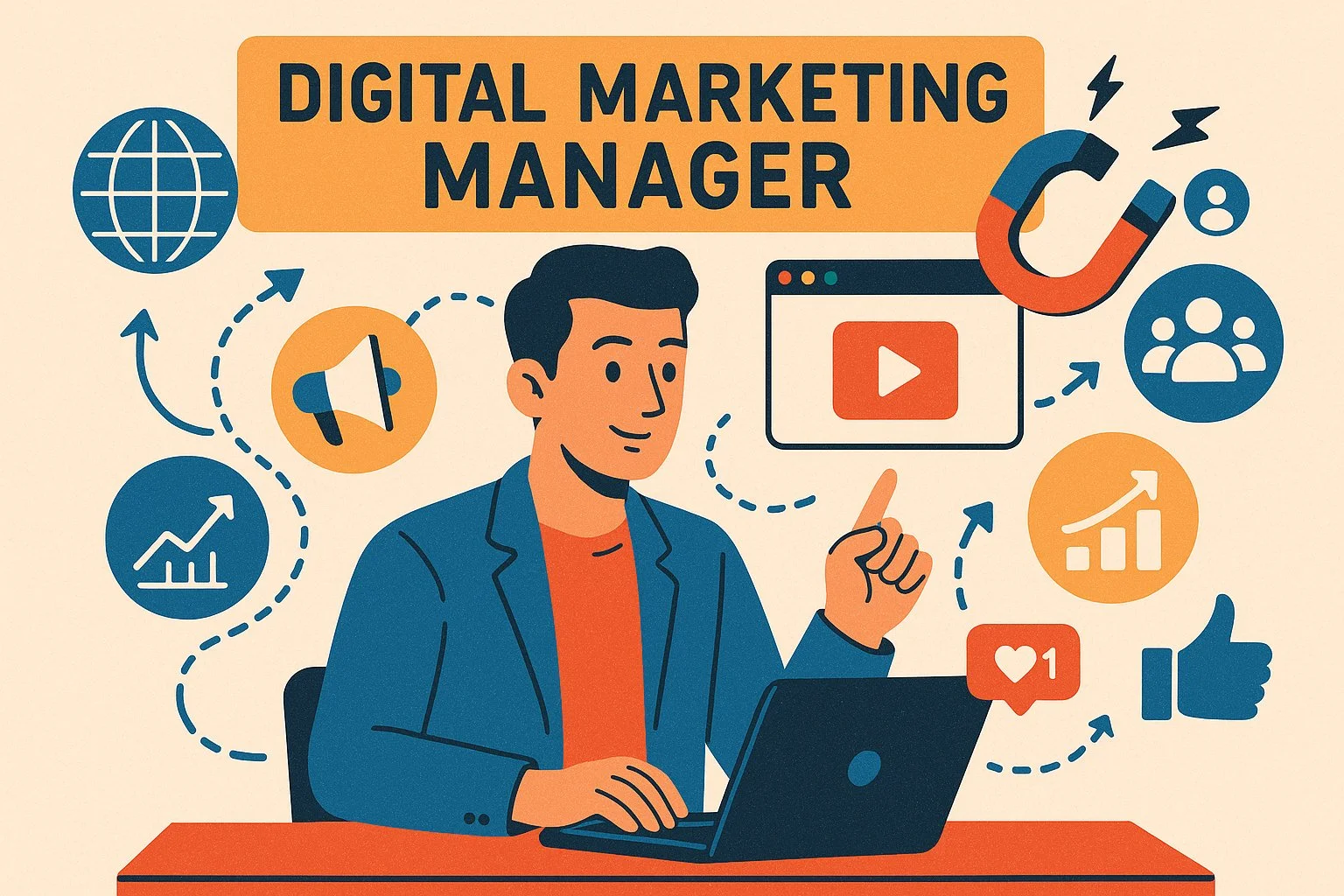8 Skills You Need to Become a Digital Marketing Manager
In today’s business landscape, companies of all sizes are investing heavily in digital marketing to boost brand awareness, attract customers, and drive sales. Unlike traditional advertising, digital channels offer measurable results, audience targeting, personalization, and real-time insights — especially with the help of artificial intelligence (AI) and data analytics.
Globally, digital ad spend continues to climb. In the U.S., Chief Marketing Officers increased digital spending by nearly 8% in the past year, while traditional ad budgets declined (The CMO Survey, 2024). Similar trends are happening in Hong Kong, where half of the companies said they plan to increase their overall spending on advertising and marketing, including digital marketing (American Express, 2025). With this rapid growth, digital marketing managers are in high demand — and the salaries reflect it. In Hong Kong, digital marketing managers earn an average annual salary of HKD 576,000, depending on their experience and specialization (Michael Page, 2025).
So, if you’re an aspiring marketer looking to climb the career ladder, here’s your roadmap to the 8 essential skills you need to become a successful digital marketing manager.
What Does a Digital Marketing Manager Do?
A digital marketing manager oversees all online marketing activities that promote a company’s products or services. They manage campaigns across multiple digital channels — including SEO, social media marketing, email marketing, and PPC advertising — to drive brand visibility, web traffic, and conversions.
The role requires a combination of creative and analytical skills. A digital marketing manager typically:
Develops and executes integrated digital marketing campaigns
Monitors results with Google Analytics and other tracking tools
Manages advertising budgets across channels
Coordinates content marketing and design teams
Optimizes landing pages and websites for better UX and conversions
Analyzes metrics to refine campaigns for ROI
In short, they are the bridge between business strategy and digital execution — ensuring every campaign aligns with company goals.
1. Strategy and Leadership
At the core of every successful digital marketing career is strategy. A digital marketing manager must see the big picture — setting clear goals, planning campaigns, and managing resources effectively. Leadership is equally important. Managing a team of specialists (from SEO experts to content creators) requires clear communication, mentorship, and decision-making skills. You’ll also need to understand the customer journey, manage budgets, and collaborate with sales and product teams. Strong strategic leaders don’t just react to trends; they anticipate them. In Hong Kong’s fast-paced market, digital managers who combine data-driven decision-making with creative thinking are highly sought after.
2. Content Marketing
“Content is king” remains true. Content marketing is how brands build relationships with audiences — through blog posts, videos, infographics, and social media. While a digital marketing manager may not write every post, they must ensure all content aligns with buyer personas, tone of voice, and campaign goals. They also oversee content calendars, SEO keyword integration, and performance analysis. Each channel needs a different approach — longer storytelling for emails, concise messaging for social posts, and educational value for blog articles. Strong content marketing not only builds trust but also supports other channels like SEO, email, and social media — making it one of the most valuable skills for managers to master.
3. Artificial Intelligence (AI)
AI has revolutionized digital marketing by enabling smarter, faster, and more personalized campaigns. Today’s marketers use AI tools like ChatGPT, Jasper, and Midjourney for content generation, keyword research, email automation, and audience segmentation. CRM systems and chatbots now integrate AI for personalization and predictive analysis. Understanding how to use AI tools gives digital marketing managers an edge. For example, learning how to create precise AI prompts, analyze predictive insights, or validate generated content helps enhance creativity and efficiency. Hong Kong companies are rapidly adopting AI — 26% of local companies using AI have deployed it for content creation (Interactive Advertising Bureau, 2025).
4. Data Analytics
Modern marketers rely on data to make decisions. A digital marketing manager must be able to interpret complex data sets and extract actionable insights. Data analytics allows you to identify which campaigns perform best, where customers drop off in the sales funnel, and how to improve ROI. Tools like Google Analytics 4, Data Studio, and Tableau are indispensable. For example, if your Instagram campaign drives traffic but has low conversion rates, analytics can reveal whether the issue lies in audience targeting or landing page design.
5. Search Marketing (SEO & SEM)
Getting found online is non-negotiable. A digital marketing manager must know how to leverage search marketing — both SEO (Search Engine Optimization) and SEM (Search Engine Marketing) — to increase visibility. SEO helps brands rank organically through keyword research, optimized content, and technical improvements. SEM, through PPC advertising, ensures faster exposure via paid search. Understanding search intent, keyword targeting, and Google Ads campaigns is essential. And with the rise of AI-powered search (like Google’s AI Overviews), predictive SEO and voice search optimization are becoming more important. Search behavior is shifting rapidly — over 88% of consumers begin their product research and read reviews on Google (WiserReview, 2025).
6. Email Marketing
Despite being one of the oldest digital channels, email marketing remains one of the most powerful tools for engagement and conversion. With the help of AI, modern platforms like Mailchimp and HubSpot allow automated workflows, segmentation, and personalized content. Marketers can analyze open rates, click-through rates, and behavior-based triggers to fine-tune strategies. Email is also valuable for first-party data collection, as users voluntarily share contact details. This is especially important as third-party cookies phase out in 2025.
7. Social Media Marketing
With over 5.56 billion global users, social media continues to dominate brand communication (Data Portal, 2025). As of early 2025, approximately 83.1% of Hong Kong’s population actively uses social media, with an average daily usage time of around 1.42 hours (Meltwater, 2025). A successful digital marketing manager understands social media marketing strategy — from content planning and community management to influencer marketing and paid social advertising. They use platforms like Instagram, TikTok, LinkedIn, YouTube, Xiaohongshu and WeChat to promote campaigns, gather customer insights, and manage brand reputation. Tactics like social listening, retargeting ads, user-generated content, and shoppable posts are essential for boosting engagement and sales.
8. UX and Website Design
Half of all consumers say their impression of a brand depends on the design of its website. That’s why user experience (UX) and web design are critical for digital marketing success. A digital marketing manager must ensure that websites are visually appealing, fast, and mobile-optimized — with a seamless path from landing to conversion.
Ask yourself:
Is navigation intuitive?
Are CTAs clear and persuasive?
Is the design consistent across digital channels?
Good UX also boosts SEO rankings and conversion rates. In Hong Kong’s mobile-first market — where 93.7% of users access the internet via smartphone — ensuring responsive, mobile-friendly design is a must (Meltwater, 2025).
Bonus: Soft Skills That Make You Stand Out
Beyond technical expertise, the best digital marketing managers have strong soft skills — including adaptability, creativity, problem-solving, and communication. Employers value professionals who can collaborate across departments, manage crises calmly, and think strategically while inspiring their teams. As digital marketing continues to evolve, so must your mindset — stay curious, open to learning, and proactive in upskilling.
Conclusion
Becoming a digital marketing manager is both challenging and rewarding. It’s a role that blends creativity with analytics, strategy with leadership, and innovation with execution. By mastering the 8 key skills — from strategy and content marketing to AI, SEO, and social media marketing — you’ll position yourself for long-term success in Hong Kong’s growing digital economy. Remember, continuous learning is the real secret to advancement. The marketing world moves fast — and the best managers are the ones who keep learning, experimenting, and evolving.
Guiding You to Success with Bonfire
At Bonfire, we offer the Certified Digital Marketing Professional (CDMP) – DMI Pro, a self-paced online program where you’ll learn the most relevant and up-to-date digital marketing skills.
This course will teach you the fundamentals of digital marketing while diving into key specialisms such as SEO, SEM, email marketing, social media marketing, and much more.
It’s designed to give you the confidence and expertise to thrive in today’s competitive digital landscape.

